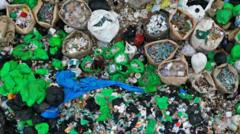In what was intended to be the final round of negotiations for a global treaty addressing the escalating plastic pollution crisis, over 200 nations gathered in Busan, South Korea, but failed to reach consensus after two years of discussions. The continuing divide between nearly 100 environmentally-focused countries advocating for the elimination of plastic and oil-producing nations cautioning against measures that could hinder global development proved insurmountable.
The treaty, initially called for during an agreement in 2022, was intended to set robust measures against plastic pollution, especially emphasizing its detrimental impact on marine environments. The United Nations indicates that since 1950, more than nine billion tonnes of plastic have been produced, with fewer than 10% recycled, allowing an alarming amount of waste to infiltrate oceans and pose significant threats to wildlife.
Kuwait negotiators, representing the views of several oil-dependent countries, stated, "The objective of this treaty is to end plastic pollution, not plastic itself," reflecting the contentious nature of the discussions towards Article 6, which focuses on production limits versus recycling enhancement. A group of 95 nations including the UK, EU, African states, and Latin American representatives, expressed support for legally binding reductions in plastic production, urging collective action in the face of ecological and public health crises.
Environmental advocates expressed frustration over the stalled negotiations, citing pervasive influences from the fossil fuel sector as a disruptive force in reaching a compromise. A recent report from InfluenceMap revealed extensive interventions from petrochemical companies primarily opposing production restrictions. Despite the friction, significant backing exists from major plastic product manufacturers like Unilever, Mars, and Nestlé for a coherent global regulatory approach to tackle plastic waste.
With the expectation that conversations may resume next year, calls for a separate treaty among the high ambition nations are surfacing. As Eirik Lindebjerg from the World Wide Fund for Nature articulated, the continued support among many nations for substantive commitments reflects a readiness for action against plastic pollution that should not be overlooked.
The urgency to address the growing epidemic of plastic waste remains as over 171 trillion pieces of plastic are estimated to litter the oceans, threatening ecological systems and public health alike.
















